自考英语二重点总结2023
自考英语二快速提分攻略及作文常用模板
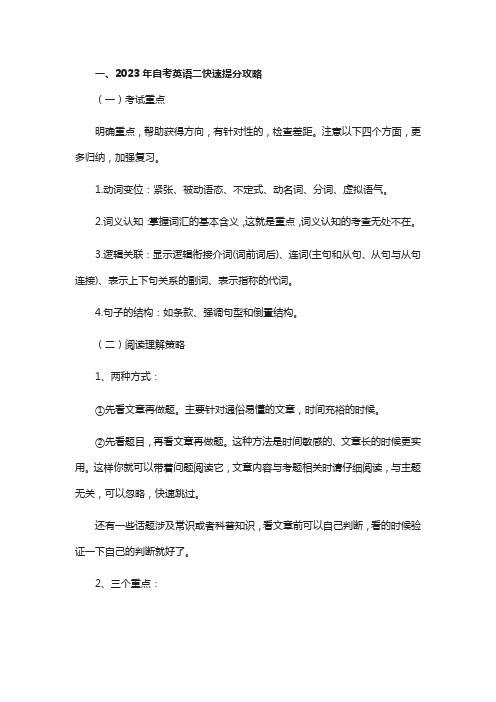
一、2023年自考英语二快速提分攻略(一)考试重点明确重点,帮助获得方向,有针对性的,检查差距。
注意以下四个方面,更多归纳,加强复习。
1.动词变位:紧张、被动语态、不定式、动名词、分词、虚拟语气。
2.词义认知:掌握词汇的基本含义,这就是重点,词义认知的考查无处不在。
3.逻辑关联:显示逻辑衔接介词(词前词后)、连词(主句和从句、从句与从句连接)、表示上下句关系的副词、表示指称的代词。
4.句子的结构:如条款、强调句型和倒置结构。
(二)阅读理解策略1、两种方式:①先看文章再做题。
主要针对通俗易懂的文章,时间充裕的时候。
②先看题目,再看文章再做题。
这种方法是时间敏感的、文章长的时候更实用。
这样你就可以带着问题阅读它,文章内容与考题相关时请仔细阅读,与主题无关,可以忽略,快速跳过。
还有一些话题涉及常识或者科普知识,看文章前可以自己判断,看的时候验证一下自己的判断就好了。
2、三个重点:除了题名本身需要的细节才能找到,读书时注意不要逐字逐句地骂人,但要专注。
①关注第一段、尾部,第一句、最后一句话因为这些部分往往是作者想谈的论据、主题或中心思想,抓住了行李箱,那么细节就解决了。
②专注于文本标记句子之间、段落和段落之间由这种词连接,掌握了这些词就等于掌握了句句、段之间的关系,获取所需信息、准确答案至关重要。
话语标记主要表达:(1)例子,如:for instance ,for example;(2) 枚举(3)相比;(4) 转折与对比;(5)原因;(6) 结果;(7) 方法;(8) 时间;(9)地方;(10) 目的;(11)分类;(12)补充;(13)强调;(14)(健康)状况;(15)综上所述。
③专注于长句、难句因为英语表达通常以冗长着称,对于高度理性的文章尤其如此。
用更长的句子表达复杂的想法,让文章更有说服力。
所以,当我们阅读,长句、难句,仔细分析句子,握住钥匙。
实际上,很多问题都是关于这些长句子、设置难句。
(三)论文写作策略作文直接反映了考生综合运用英语的书面表达能力。
全国英语二自考知识点总结

全国英语二自考知识点总结一、单元一:Unit 11.词汇知识首先学习了有关家庭和亲属关系的词汇。
根据不同的年龄和性别,家庭成员有爷爷、奶奶、爸爸、妈妈、姐姐、弟弟、儿子、女儿等。
亲属关系包括父母、子女、兄弟姐妹等。
2. 语法知识The use of the verb "to be"主要通过学习“be动词”的用法及其扩展,掌握了be动词的不同形式——am、is、are,以及其用法和基本句型。
英语中的复数形式了解了英语中名词的复数形式的构成规则,掌握了常见名词复数形式的变化规则。
3. 阅读技能通过描述和介绍家庭生活等内容的基础英语对话,学会了正确地理解阅读中的词语和句子,提高了阅读理解能力。
4. 写作技能掌握日常生活中描述家庭成员、自己爱好以及介绍自己的能力。
同时,学习了一般现在时的句子结构及常见问句的构成和用法,提高了日常生活中口语交际的能力。
5. 听力技能掌握了通过听力材料听懂日常生活中的一些简单对话,提高了日常生活中的交际能力。
二、单元二:Unit 21. 词汇知识学习了身体部位的名称,如head,shoulder,arm,hand,finger,leg,foot等。
2. 语法知识The use of the Simple Present Tense学习了一般现在时的基本构成和常见句型,提高了一般现在时的使用能力。
动词的否定句和疑问句掌握了动词的否定形式和疑问形式的基本构成和用法,提高了相关问句句型的灵活运用。
3. 阅读技能阅读理解内容主要涉及描述人体部位的基础知识,通过阅读加深了对这些知识的掌握和理解。
4. 写作技能学习了用英语如何正确描述自己的身体部位和健康状况,提高了描述自己和他人的能力,了解了一般现在时句型的使用。
5. 听力技能掌握了通过听力材料了解日常对话中关于身体部位和健康状况的内容,提高了日常交际和应对紧急情况的能力。
三、单元三:Unit 31. 词汇知识学习了有关学校生活的词汇,包括学校设施、课程安排、学习用品等。
英语二自考重点
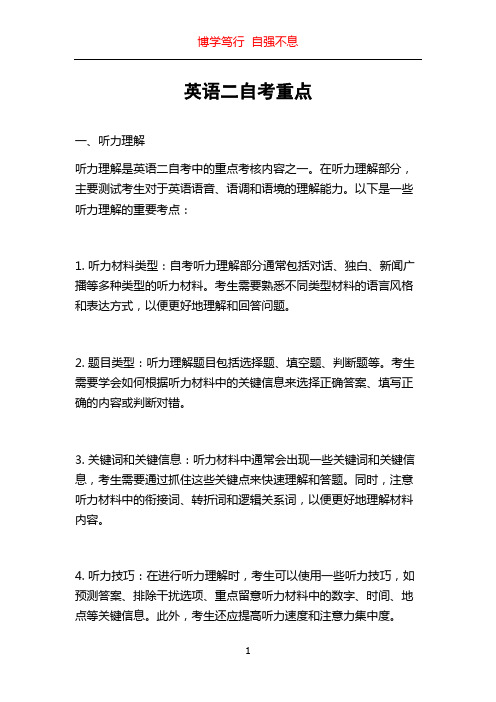
英语二自考重点一、听力理解听力理解是英语二自考中的重点考核内容之一。
在听力理解部分,主要测试考生对于英语语音、语调和语境的理解能力。
以下是一些听力理解的重要考点:1. 听力材料类型:自考听力理解部分通常包括对话、独白、新闻广播等多种类型的听力材料。
考生需要熟悉不同类型材料的语言风格和表达方式,以便更好地理解和回答问题。
2. 题目类型:听力理解题目包括选择题、填空题、判断题等。
考生需要学会如何根据听力材料中的关键信息来选择正确答案、填写正确的内容或判断对错。
3. 关键词和关键信息:听力材料中通常会出现一些关键词和关键信息,考生需要通过抓住这些关键点来快速理解和答题。
同时,注意听力材料中的衔接词、转折词和逻辑关系词,以便更好地理解材料内容。
4. 听力技巧:在进行听力理解时,考生可以使用一些听力技巧,如预测答案、排除干扰选项、重点留意听力材料中的数字、时间、地点等关键信息。
此外,考生还应提高听力速度和注意力集中度。
二、阅读理解阅读理解是英语二自考中的另一个重点考核内容。
在阅读理解部分,主要测试考生对于英语文章的理解和分析能力。
以下是一些阅读理解的重要考点:1. 文章类型:自考阅读理解部分通常包括科技、社会文化、教育等多个领域的文章。
考生需要熟悉不同类型文章的特点和语言表达方式,以便更好地理解文章和回答问题。
2. 题目类型:阅读理解题目包括选择题、填空题、判断题等。
考生需要学会如何根据文章的关键信息和语境来选择正确答案、填写正确内容或判断对错。
3. 关键词和关键信息:文章中通常会出现一些关键词和关键信息,考生需要通过抓住这些关键点来快速理解和答题。
同时,注意文章中的转折词、逻辑关系词和推理关系词,以便更好地理解文章和题目。
4. 阅读技巧:在进行阅读理解时,考生可以使用一些阅读技巧,如预测答案、找出关键信息、关注文章的段落结构和主题句。
此外,考生还应提高阅读速度和注意力集中度。
三、写作能力写作是英语二自考中的重点考核内容之一。
自考英语二知识点知乎
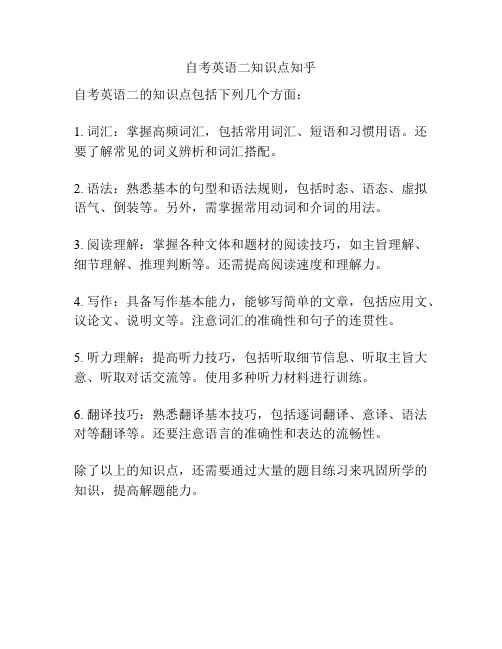
自考英语二知识点知乎
自考英语二的知识点包括下列几个方面:
1. 词汇:掌握高频词汇,包括常用词汇、短语和习惯用语。
还要了解常见的词义辨析和词汇搭配。
2. 语法:熟悉基本的句型和语法规则,包括时态、语态、虚拟语气、倒装等。
另外,需掌握常用动词和介词的用法。
3. 阅读理解:掌握各种文体和题材的阅读技巧,如主旨理解、细节理解、推理判断等。
还需提高阅读速度和理解力。
4. 写作:具备写作基本能力,能够写简单的文章,包括应用文、议论文、说明文等。
注意词汇的准确性和句子的连贯性。
5. 听力理解:提高听力技巧,包括听取细节信息、听取主旨大意、听取对话交流等。
使用多种听力材料进行训练。
6. 翻译技巧:熟悉翻译基本技巧,包括逐词翻译、意译、语法对等翻译等。
还要注意语言的准确性和表达的流畅性。
除了以上的知识点,还需要通过大量的题目练习来巩固所学的知识,提高解题能力。
英语二重点知识点归纳总结
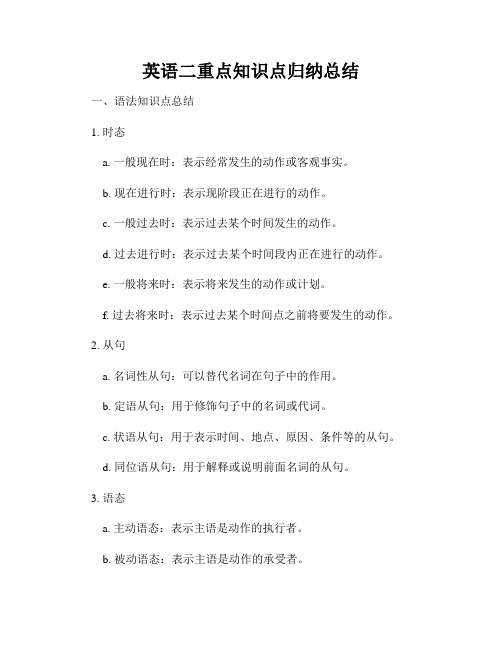
英语二重点知识点归纳总结一、语法知识点总结1. 时态a. 一般现在时:表示经常发生的动作或客观事实。
b. 现在进行时:表示现阶段正在进行的动作。
c. 一般过去时:表示过去某个时间发生的动作。
d. 过去进行时:表示过去某个时间段内正在进行的动作。
e. 一般将来时:表示将来发生的动作或计划。
f. 过去将来时:表示过去某个时间点之前将要发生的动作。
2. 从句a. 名词性从句:可以替代名词在句子中的作用。
b. 定语从句:用于修饰句子中的名词或代词。
c. 状语从句:用于表示时间、地点、原因、条件等的从句。
d. 同位语从句:用于解释或说明前面名词的从句。
3. 语态a. 主动语态:表示主语是动作的执行者。
b. 被动语态:表示主语是动作的承受者。
4. 语气a. 直陈语气:陈述事实或客观真相。
b. 疑问语气:用于提问句。
c. 祈使语气:用于表示命令、请求等。
二、词汇知识点总结1. 同义词a. 贫穷:穷困、贫困、贫乏。
b. 快乐:高兴、愉快、欢乐。
c. 困惑:迷茫、疑惑、困惑。
2. 反义词a. 宽敞:狭窄、狭小、狭隘。
b. 兴奋:平静、冷静、淡定。
c. 美丽:丑陋、难看、丑恶。
3. 近义短语a. 开始:着手、动手、踏上。
b. 结束:完成、终结、结束。
c. 增加:提高、扩大、增长。
4. 词汇搭配a. 提出建议:make suggestions、offer advice、give recommendations。
b. 进行研究:conduct research、carry out investigations、undertake studies。
c. 做出决定:make decisions、come to conclusions、reach resolutions。
三、阅读技巧总结1. 略读:快速浏览文章,了解大意和段落主题。
2. 扫读:快速查找关键信息,如数字、日期等。
3. 分段阅读:逐段阅读,加强理解每个段落的细节。
(完整版)自考英语二重点讲解复习资料
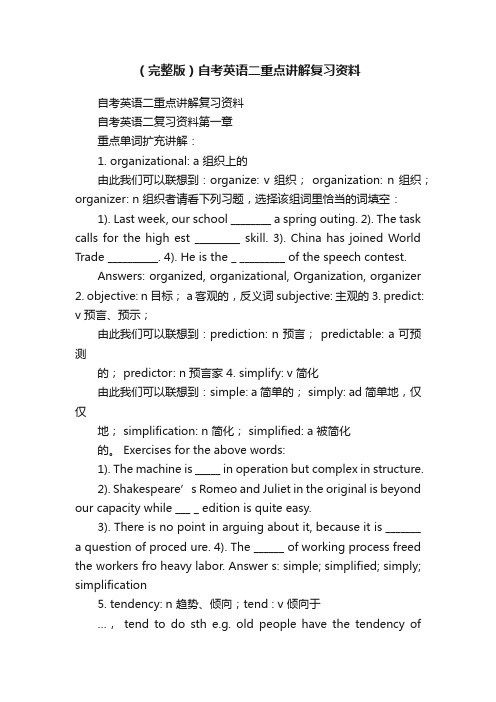
(完整版)自考英语二重点讲解复习资料自考英语二重点讲解复习资料自考英语二复习资料第一章重点单词扩充讲解:1. organizational: a 组织上的由此我们可以联想到:organize: v 组织; organization: n 组织;organizer: n 组织者请看下列习题,选择该组词里恰当的词填空:1). Last week, our school ________ a spring outing. 2). The task calls for the high est _________ skill. 3). China has joined World Trade __________. 4). He is the _ _________ of the speech contest.Answers: organized, organizational, Organization, organizer 2. objective: n 目标; a 客观的,反义词subjective: 主观的 3. predict: v 预言、预示;由此我们可以联想到:prediction: n 预言; predictable: a 可预测的; predictor: n 预言家 4. simplify: v 简化由此我们可以联想到:simple: a 简单的; simply: ad 简单地,仅仅地; simplification: n 简化; simplified: a 被简化的。
Exercises for the above words:1). The machine is _____ in operation but complex in structure.2). Shakespeare’s Romeo and Juliet in the original is beyond our capacity while ___ _ edition is quite easy.3). There is no point in arguing about it, because it is _______a question of proced ure. 4). The ______ of working process freed the workers fro heavy labor. Answer s: simple; simplified; simply; simplification5. tendency: n 趋势、倾向;tend : v 倾向于…,tend to do sth e.g. old people have the tendency ofgetting fatter. Or old peop le tend to get fatter. 6. managerial: a 经理的、经营上的;由此我们可以联想到:manage: v管理、经营; management: n; manager: n 经营者,管理者; manageable: a 可管理的、可经营的。
自考英语(二)考试重点语法,课文重点讲义
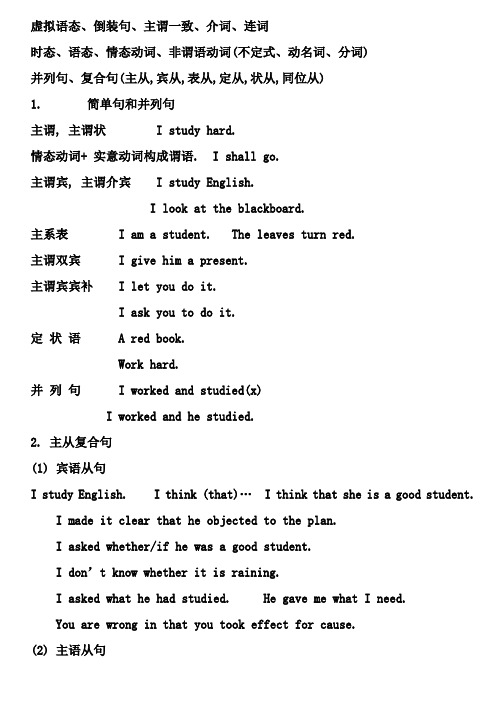
虚拟语态、倒装句、主谓一致、介词、连词时态、语态、情态动词、非谓语动词(不定式、动名词、分词)并列句、复合句(主从,宾从,表从,定从,状从,同位从)1. 简单句和并列句主谓, 主谓状 I study hard.情态动词+ 实意动词构成谓语. I shall go.主谓宾, 主谓介宾 I study English.I look at the blackboard.主系表 I am a student. The leaves turn red.主谓双宾 I give him a present.主谓宾宾补 I let you do it.I ask you to do it.定状语 A red book.Work hard.并列句 I worked and studied(x)I worked and he studied.2. 主从复合句(1) 宾语从句I study English. I think (that)… I think that she is a good student.I made it clear that he objected to the plan.I asked whether/if he was a good student.I don’t know whether it is raining.I asked what he had studied. He gave me what I need.You are wrong in that you took effect for cause.(2) 主语从句That the sun moves around the earth is the truth.( it is the truth that..)Whether it is raining is not known.It is not known--computers will one day have vision as good as human vision.A.whetherB. ifC. thatD. howIt goes without saying that we are not living in a traditional society. Who will come to the meeting remains unknown.翻译题: In a sense, what he said amounts to threat.(3) 表语从句Your greatest fault is that you are careless.The problem is what we should do to help him.(4) 形容词补语从句We feel proud that our team has won every match this year.He wasn’t sure whether he should stay or leave.Are you certain who he is?(5) 同位语从句(fact, news, idea, opinion, concern, hope, theory, decision, discovery, conclusion, report,order, question, problem, belief, truth, answer, statement, promise, possibility.)The news that he intended to come gave us much pleasure.(6) 状语从句时间状语从句When I studied, the bell rang.She was going upstairs when suddenly the light went out.He had no sooner died than/ he had hardly died when the family arguments began.地点状语从句He live where he liked.原因状语从句He was late because he missed the bus.Now that you mention it, I do remember.I’m in a slightly awkward posit ion, in that my secretary is on holiday at that moment.目的状语从句We have so arranged matters that one of us is always on duty.Bring it closer so that I may see it better.结果状语从句He brought a big house so( that) he had more space to paint in.He made such a good speech that he won warm applause.翻译题:The brothers looks so alike that it is difficult to tell them each other条件状语从句If I make a promise, I keep it.I’ll lend you the money , as/so long as you take my advice.These messages will become rubbish unless some measures have been taken. 让步状语从句Although/ though he was Spanish, he spent most of his life in Germany. Whatever/ No matter what happens, you must be calm and quiet.However/no matter how loudly you shout, you won’t be heard.方式状语从句I have changed the plan as you suggested.As if ( as though)比较状语从句(重点)She is as tall as Tom( is) I arrived as early as you (did)Mary was older/more careful than Tom( was)Mary works harder /more carefully than Tom( does)Bill speaks French ----( badly) than he writes it.The –( far)away we get from the earth, the thinner the air becomes. further进(8) 定语从句在从句中成份+连词She is a beautiful girl. I like the girl who is beautiful.( who主语) This is the film that I see.This is the boy who (whom)(--) you met yesterday. (主语)Tell me something about the man for whom I shall be working / (whom) I shall be working for.I read the book whose cover is red.You are still the same person as I knew ten years ago.I never heard such stories as he told.This is the day when( on which) I joined the league.This is the house where( in which) I live./ This is the house I live in. 非限定性定语从句:He met Mary, who invited him to dinner.I gave the book to Tom, whom/ who I found after the meeting.Her doctor, whose office was newly decorated, started to charge higherfee.His latest play, which was well reviewed by the critics, has been a great success.I called him by the wrong name, for which mistake I apologized.Prof. Emery, about whom everyone is taking these days.There are only four areas ____ very many diamonds have been found.A.whereB.whenC.thatD.whichWhere用在定语从句和状语从句的区别I’ll go to the place (where I live)I’ll go wherever work conditions are difficult.定语从句和同位语从句的区别The news (that our team had won)was known to all.This is the film that (I see).考题: Such people – you describe are rare nowadays.a. asb. thatc. whod.whichAnyone ---( want) to understand the industry of the future will have to know about IT . [who want]Who wants Many of us visited the industrial exhibition,---,to our disappointment, we saw very few high-tech products.a. whereb. whichc. asd. that3. 并列复合句He said that he would give up smoking, but nobody believe it.I never saw a busier person than she seemed to be; yet it was difficult to say what he she did.重点语法——动词的时态和语态时态的呼应I thought the experiment was going on now.She said this apparatus would be available next week.Am/is/are/+ done. This room is cleaned every day.Was/were +done This room was cleaned yesterday.Will be+ done This room will be cleaned.Am/is/are being done This room is being cleaned at the moment. Was/were being done This room was being cleaned when I arrived. Have/has been done My car has been repaired.Had been done The room looks much better. It had been cleaned. No sooner had I arrived at the theatre than the film began. Hardly….. whenSome people think that the relations between people have deteriorated-( deteriorate) so much that understanding and friendship are almost impossible.Nearly a week passed before the girl was able to explain what had happened (happen) to her.非谓语动词(1) 动词不定式做主语 To see is to believe.What to do next has not been decideIt is not easy to remember all these words.表语 To know everything is to know nothing.定语 This is a book to be written.宾语 I want to study.He found it impossible to keep silent any longer.宾补 They warned me not to be late.I let you do it(make, have, see, watch, notice, look at, observe, smell, listen to, hear,perceive)状语 Yesterday he came to see me.独立成份 To be frank, she is not my girlfriend.形容词补语 I am glad to hear the news.不定式的逻辑主语 For a bridge to collapse like that is unbelievable. 不定式的时态和语态 to do(be) , to be+p.p.to have done, to have been done动名词主,表语 Seeing is believingTom’s going there won’t do any harm.My hobby is collecting stamps.定语 This is a swimming poor. ( a poor for swimming)This is a hiding place ( a place for hiding )宾语 I enjoy studying (mind, keep, appreciate, can’t help, consider, postpone,suggest,admit etc.)Do you mind my smoking here?介词+ 宾语I used to doing. (confess to, look forward to, object to doing sth.) be involve in, consist of, be fond of, etc.动名词的时态和语态基本形同分词的时态和语态分词状语 When I saw the film, I felt sad = Seeing the film, I felt sad. Because it is Sunday today, we have no school.It being Sunday, we have no school.When the job was finished, we went home straight away.The job finished, we went home straight away.定语 The boy standing there is a classmate of mine.=The boy who is standing there is a classmate of mine.The used car. A broken cup the question involved.表语 The film is exciting. All the windows are broken.宾补 I found them watering flowers.( I found that they were watering flowers.I found the flowers watered. ( I found the flowers watered)分词的时态和语态.( 形同动名词)doing (being) being donehaving done having been done______nothing to say, the boy shield way form the crowd.A. HavingB. Have C Had. D. Having beingWhat developed was a music readily taking ( take) on various forms.Not having got (not get) enough hands, she had great difficulty in accomplishing the task.非谓语动词答题要点1. Anyone wanting (want) to understand the industry of the future will have to know about robotics.2.A Filipino maid was executed in Singapore after being convicted (convict)of murder.3. As research techniques become more advanced, the number of animals used( use) in experiments may decrease.Not have got (not, get)enough hands she had great difficulty in accomplishing the task.It is a well-known fact that a person will move in a circle when he cannot use his eyes to control ( control) his direction.As I’ll be away for a year,I’d appreciate hearing (hear)from you now and then.Object to , confess to , look forward to + doing.介词+ doing.If I had remembered --- the window, the thief would not have got in.a. to closeb. closingc. to have closed. having closed. Begin, start, intend, continue to do, doing 的区别不大The baby began crying. The baby began to cry.Try to do. 努力去做 Try doing 尝试去做.I was very tired. I tired to keep my eyes open, but I couldn’t.I can’t find anywhere to live.______, they began to get down to business. A. The holidays being over B. The holidays are over C. The holidays were over D. The holidays had been overV+ing及从句的固定用法It’s no use doing sth.It’s no use worrying about it. There’s nothing you can do.It’s (not) worth doing sth.Have difficulty doing sth.Spend time (in) doing sth.There is no doubt that.强调句1. 强调主语 It is I that/who am to blame2. 强调直接宾语 It was a glass that Mary broke.3. 强调间接宾语 It was him that I gave the pen to.4. 强调介词宾语 It is this room that I am living in.5. 强调状语1) 时间状语 It was last year that Tom graduated from high school.2) 地点状语 It was under the bridge that we found him.3) 原因状语 It was for his arrogance that I dislike him.4) 目的状语 It was for pleasure that I read it.不仅可以是陈述句, 还可以是疑问句和感叹句.Was it you that/who lost a watch yesterday? What great progress it was that you made.强调句可以是一个从句, 被强调的部分也可以是从句.I was told that it was because he hadn’t received the invitation that he didn’t comeIt was there, the police believe,she was able to activate the recorder she kept in her bag.A. thatB.untilC. whichD. when虚拟语气第一类型: 见词就填:A. (should ) do(should) beB. (should) be +过去分词第一类型虚拟语气 A第一类型虚拟语气 B见某些形容词要虚拟Urgent, necessary, important, possible, essential, incredible, natural, ridiculous, vital, imperative, crucial, critical, proper, compulsory, etc.形容词带的从句: It is important that every member (should) inform himself of these rules.主语从句: It is decided that the meeting (should) be postponed.宾语从句: He insisted that his daughter (should) come.表语从句: The doctor’s advice is that the patient (should) be kept quiet. 同位语从句: He gave order that the guests (should) be hospitably entertained.考题: They demanded that the right to vote----(give) to every adult person. [(should) be given]For a child to give up less mature idea for a more sophisticate one, it requires that the child ____ psychologically ready for the new idea.A.isB.beC.wereD.would be第二类型: if 的非真实条件句( 可能性小或没有可能)注意: if 可以引导真实条件句,多是条件状语从句.第二类型虚拟语气 (时态到推的概念)第二类型虚拟语气举例省略if 的倒装were, had , should.If the doctor had been available, the child would have been saved.Had the doctor been available, the child would have been saved.考题:_____for your help, I would not have overcome the psychological pressures and tensions.A. Had it not beenB. not beenC. Without beingD. not having been 特殊虚拟?Even if 形式上与if 相同Wish形式上大体与if 从句相同从句谓语与Wish同时 Wish+主语+V.ed/wereI wish I were as young as you.从句谓语发生Wish之前多用Wish+主语+had done(been)I wish that he had not made so much trouble.从句谓语发生Wish之后用Wish+主语+would(could) + v.I wish you would stay with me far a whileI wish I could fly.It is (about. High..) time that + 从句 (V.ed)It is high time that we began to work.In case, lest, for fear that (should)+ V.The mad man was out in the padded cell lest he ---himself.A. injureB. had injured c. injured d. would injure.Would rather =had rather, would just as soon, would sooner, would prefer 多加过去式表示尚未发生的动作.倒装句全部倒装 In came Jack. Now comes your turn.Among them were two girls.部分倒装Hardly/scarcely/barely had we got on the bus when it began to rain.No sooner had he put down the receiver than the telephone rang again.Not until many years later did the whole truth become known.Not only did he win the championship in the race, but he also broke the world record.Neither my sister nor I have traveled by air.Never, nowhere, no longer, little, feww, not…( not a single word) no. (at no time, by no means, in no way, on no account, under/in no circumstances) Only here can you buy fresh eggs.主谓一致要点To become actresses is their ambition.Nodding often means you say” yes.”What I did was to give her a book. Neither she nor I am wet.Many a student doesn’t like having to do their homework.连词连接代词 who, whom, whose, what, which, whoever, whatever, which ever 连接副词 when, how, why, where, whenever, wherever并列连词 and, but, or, so , therefore, yet, however, nevertheless, for, hence, as well as, both..and, not only..but also, either..or, neither..nor, 从属连词 after, when, before, as, while, since, until, till, although, though, if , even if, unless, lest, because, than, that, whether, so that, as soon as, as long as, in order that, as if, as though, in case, now that, so..that, such..that, as .as.When we play a game, we enjoy what we are doing, --- we should not play it.A. otherwiseB. insteadC. neverthelessD. either不定代词Any,one,none,nothing, neither, either, both, all, anyone, any one, some, any, much, manyAre you sure there are not--- sharks here? A.any B. some C. many D. much.Used to , be used to doingFrank lives alone,. He doesn’t mind this because has lived alone for 15years. So he is used to it. He is used to living alone.These days I usually stay in bed until late. But when I had a job, I used to get up early.词汇题常考动词搭配Come, carry, take, go,get,cut, make, put ,turn, bring.完型填空题型分析考察重点主谓一致,动词时态和语态,名词的数,代词,形容词副词的比较级,介词和连词.常用词语搭配.70%考连词,代词,介词以及承上启下的其他词和词组.方法: 先跳空通读全文,然后根据语法结构, 语义连贯,词与词的搭配填空, 最后在通读全文. 注意顾全大局.选的是最佳答案.词型填空题大部分为动词.阅读理解题型分析考察(1)词和短语的意义(2)句子表达的各个内容之间的关系(3)文章的主题思想和大意(4)文章或某句的内在含义及推理(5)文章作者的态度.答题方法:先看题—阅读的难点不是考试的重点,不要死扣一句,第一段和最后一段, 段首和段尾句,多数题目可以在文章中找到相应的段落,句子或短语.翻译题评分原则为:(1) 主要语法错误(如动词时态、语态、虚拟语气、主谓一致、否定、疑问以及其他句型错误)或影响基本句意的重要用词错误扣1分。
2023年4月高等教育自学考试英语(二)
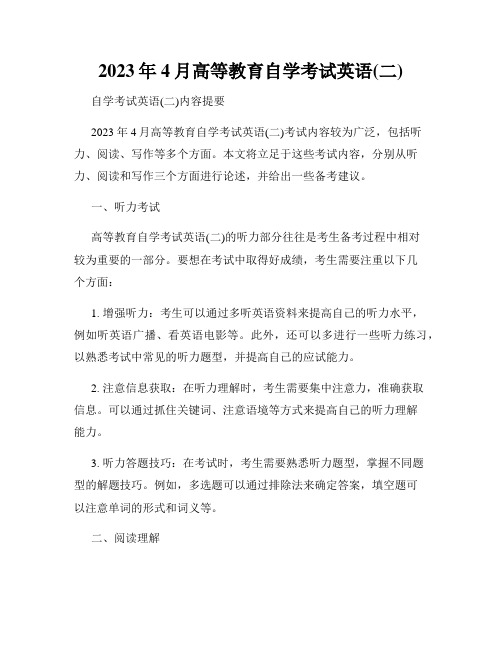
2023年4月高等教育自学考试英语(二)自学考试英语(二)内容提要2023年4月高等教育自学考试英语(二)考试内容较为广泛,包括听力、阅读、写作等多个方面。
本文将立足于这些考试内容,分别从听力、阅读和写作三个方面进行论述,并给出一些备考建议。
一、听力考试高等教育自学考试英语(二)的听力部分往往是考生备考过程中相对较为重要的一部分。
要想在考试中取得好成绩,考生需要注重以下几个方面:1. 增强听力:考生可以通过多听英语资料来提高自己的听力水平,例如听英语广播、看英语电影等。
此外,还可以多进行一些听力练习,以熟悉考试中常见的听力题型,并提高自己的应试能力。
2. 注意信息获取:在听力理解时,考生需要集中注意力,准确获取信息。
可以通过抓住关键词、注意语境等方式来提高自己的听力理解能力。
3. 听力答题技巧:在考试时,考生需要熟悉听力题型,掌握不同题型的解题技巧。
例如,多选题可以通过排除法来确定答案,填空题可以注意单词的形式和词义等。
二、阅读理解在高等教育自学考试英语(二)中,阅读理解部分占据较大比重。
为了在考试中拿到高分,考生需要注意以下几点:1. 阅读速度:考生需要培养较快的阅读速度,以便在有限的时间内完成阅读理解题目。
可以通过平时多读英文材料来提高自己的阅读速度。
2. 关注文章结构:在阅读理解过程中,考生需要关注文章的结构,理清文章的主旨和段落之间的逻辑关系。
这样可以更好地把握文章的内容和思路。
3. 掌握解题技巧:考生需要熟悉不同类型的阅读理解题型,并掌握相应的解题技巧。
例如,选择题可以通过排除法进行选择,填空题可以根据上下文来断定答案等。
三、写作能力写作是高等教育自学考试英语(二)中的重要环节。
要想在写作中取得良好的成绩,考生需要注意以下几个方面:1. 提前准备:考生可以提前准备一些常用的句型和词汇,用于写作时的表达。
还可以通过模拟写作练习来提高自己的写作能力。
2. 清晰逻辑:在写作过程中,考生需要注意文章的逻辑结构,尽量做到段落之间的衔接自然、观点清晰。
- 1、下载文档前请自行甄别文档内容的完整性,平台不提供额外的编辑、内容补充、找答案等附加服务。
- 2、"仅部分预览"的文档,不可在线预览部分如存在完整性等问题,可反馈申请退款(可完整预览的文档不适用该条件!)。
- 3、如文档侵犯您的权益,请联系客服反馈,我们会尽快为您处理(人工客服工作时间:9:00-18:30)。
自考英语二重点总结2023可以按照以下内容回答:
一、词汇部分
1. 掌握词汇量:自考英语二要求考生掌握约3500个单词和550个常用词组。
2. 重点词汇:重点关注表示情感、态度、观点、心理的词汇,如:optimistic,pessimistic,confident,uncertain,hopeful等;表示感觉、情绪的词汇,如:sad,happy,anxious,angry,frustrated等;表示频度的词汇,如:always,usually,often,sometimes,seldom等。
3. 常用短语:特别关注短语搭配,如:across the street,on one’s way to…,wait in line,play a role in等。
4. 构词法:了解词根、前缀和后缀的用法,如:un-(表示否定)、re-(表示重复)、dis-(表示否定)、-ness(表示抽象名词)、-able(表示形容词)等。
二、语法部分
1. 句法结构:重点关注五大基本句型、强调句型、虚拟语气、倒装语序等。
2. 时态和语态:熟练掌握现在完成时、一般现在时、一般过去时、过去完成时等时态,以及被动语态的用法。
3. 非谓语动词:了解不定式、动名词、现在分词和过去分词的区别,重点掌握它们的用法。
4. 名词性从句:了解主语从句、宾语从句、表语从句和同位语从句的用法,重点关注引导词的选择。
5. 定语从句:掌握关系代词和关系副词的选择,重点理解限制性定语从句和非限制性定语从句的区别。
三、阅读理解
1. 阅读技巧:掌握如何快速阅读、如何找关键词、如何推理等阅读技巧。
2. 常考题型:重点掌握细节理解题、主旨大意题、推理判断题等常见题型。
3. 文化背景知识:适当了解一些相关的文化背景知识,有助于更好地理解文章。
四、完形填空
1. 语境理解:注意上下文的联系,理解语境含义,确定答案。
2. 常用搭配:掌握常用词汇和短语的搭配,有助于提高正确率。
3. 语法知识:结合语法知识来分析选项的用法和意义,有助于做出正确的选择。
五、写作部分
1. 写作技巧:了解写作的基本步骤和技巧,如如何谋篇布局、如何遣词造句等。
2. 常用表达:掌握一些常用的写作表达方式,如开头句、结尾句、过渡词等。
3. 常见话题:熟悉一些常见的写作话题,如个人介绍、旅游攻略、环境保护等,以便在写作时能够有话可说。
以上是自考英语二的重点总结,考生可以根据这些内容进行复习和备考。
同时,考生还可以
通过做历年真题、参加辅导班等方式来提高自己的英语水平。
